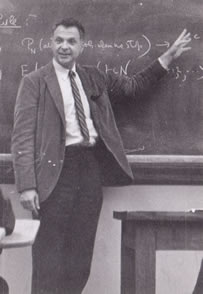
Back هربرت روبنز Arabic هربرت روبنز ARZ Herbert Robbins Catalan Herbert Robbins German Herbert Robbins French Herbert Robbins HT Հերբերտ Ռոբինս Armenian Herbert Robbins Italian Herbert Robbins Polish Herbert Robbins Portuguese
This article includes a list of general references, but it lacks sufficient corresponding inline citations. (May 2022) |
Herbert Ellis Robbins | |
|---|---|
 Herbert Robbins visiting Purdue in 1966 | |
| Born | January 12, 1915 New Castle, Pennsylvania, US |
| Died | February 12, 2001 (aged 86) Princeton, New Jersey, US |
| Alma mater | Harvard University |
| Scientific career | |
| Institutions | |
| Thesis | On the Classification of the Maps of a 2-Complex into a Space (1938) |
| Doctoral advisor | Hassler Whitney |
| Doctoral students | |
Herbert Ellis Robbins (January 12, 1915 – February 12, 2001) was an American mathematician and statistician. He did research in topology, measure theory, statistics, and a variety of other fields.
He was the co-author, with Richard Courant, of What is Mathematics?, a popularization that is still (as of 2012[update]) in print. The Robbins lemma, used in empirical Bayes methods, is named after him. Robbins algebras are named after him because of a conjecture (since proved) that he posed concerning Boolean algebras. The Robbins theorem, in graph theory, is also named after him, as is the Whitney–Robbins synthesis, a tool he introduced to prove this theorem. The well-known unsolved problem of minimizing in sequential selection the expected rank of the selected item under full information, sometimes referred to as the fourth secretary problem, also bears his name: Robbins' problem (of optimal stopping).
© MMXXIII Rich X Search. We shall prevail. All rights reserved. Rich X Search